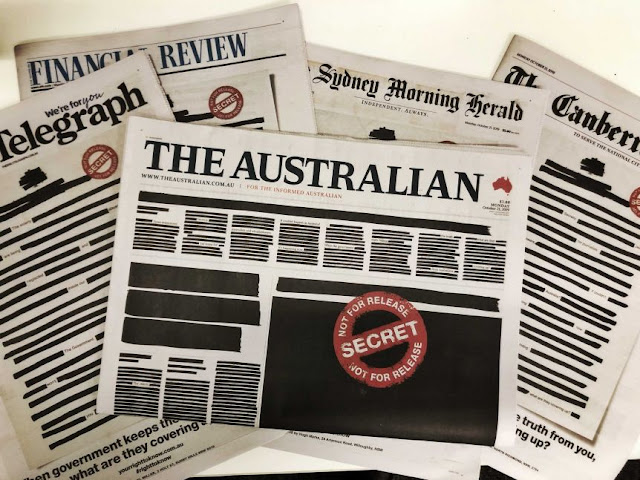Facebook – Information Czar
When
Facebook was first launched and quickly became widespread, the word on the
street was that it is a platform that will bring the world closer together. It
will, as its now defunct sub-page facebook.com/peace used to insinuate, bring
world peace by leaping over the boundaries of geography, culture, and politics.
Indeed,
the page used to show, with an image called ‘A World of Friends’, how many
friendships were made on the platform between Israelis and Palestinians, or
Indians and Pakistanis; though one might doubt the accuracy of its own fanfare.
But
some 17 years after its founding, the global giant Facebook has denied all Australian users from being able to
access news from Australian media companies, as well as potentially life-saving
information (during a pandemic and in the fire season) from the state health
departments, suicide prevention centres, the Australian Bureau of Meteorology, and
fire and rescue services.
This
squalid episode rather proves Orwell’s aphorism that ‘Saints should always be
judged guilty until proven innocent.’
Instead
of ushering in a Utopian future, its actions underlined the age-old idea that
companies, like people, have self-interests. Here, Facebook’s naked self-interest
is to make as much money as possible, even by denying a whole country access to
information and even using the work of others without paying them for it.
For
at the heart of the dispute between Facebook and the Australian government is
Australia’s proposed digital regulation laws, which will force Google and
Facebook to pay media companies for using their content.
Currently,
Google and Facebook can gather large amounts of traffic and ad revenues by
showing news stories from Australian media companies. However, the media
companies themselves often do not receive anything as the sites show large
sections of the pieces, therefore ensuring a majority of time-poor people, most
of whom scan the headlines anyway, do not click to the media companies’ own
websites, denying them traffic and ad revenues.
Many
other countries, including the EU, the US, the UK and Canada, are contemplating
similar laws for themselves, and are watching Australia as a precedent case. As
Australia passed the bill in the House of Representatives on the 17th
of February, it seems crystal clear that Facebook, by implementing its ban on
the 18th, is trying to scare off any further attempts to restrict
its money-making operation by punishing all 17 million Australian users.
People
paying attention to the behaviour of Facebook and other social media companies
may not be surprised by its blatant intrusion into constitutional processes.
These companies are ideologically very left leaning, and have been highly biased towards the Democratic Party in the US
throughout the Trump presidency.
For example, Facebook and Twitter removed the New York Post story about Hunter Biden’s alleged dirty dealings with Ukrainian businesses, at the height of the election in 2020, claiming variously that it is a hoax or that the story contains 'hacked' materials, neither of which is true. After Biden's victory however, it transpires that Hunter Biden is been actively investigated by the FBI. These same companies certainly did not ban articles about the alleged Trump-Russian collusion, which was shown to be a fabrication based on a fake dossier put together by a former British spy Christopher Steele, paid for by the Hillary Clinton campaign.
The
overwhelming power that the social media companies possess, in the age of
information, is not something that the world has not seen before. The US has
antitrust laws, implemented in 1890, ‘aimed at preserving free and unfettered
competition as the rule of trade’, in response to monopolies that arose as a
result of manufacturing booms. These monopolies got rid of competition and set
prices at the expense of consumers.
The
analogy is clear – think of the way that Google, Amazon and Apple colluded to get rid of their competitor platform
Parler. Like the railway monopoly in the 1880’s in the US that dictated the
pricing of the production, transportation and sale of all manners of goods, the
few social media companies like Facebook has monopolised the free-flow of
information, and even the frank exchange of opinions.
It
is heartening therefore to see that both aisles of Australian politics have
condemned the anti-democratic actions of Zuckerberg’s media goliath, and other countries have joined in. For, after all, why does
anyone let a company, created to rate photos of girls, run by a bunch of 20
something and 30 something Silicone Valley small ‘L’ liberal types, decide that
17 million Australians shall not be able to access news?
This
episode exemplifies what should have been done much earlier – that the US need
to have clearly written laws about the responsibilities and powers that these
social media companies may exercise, not only in America, but across the world.
Failing this, these monopolies should be broken up, so that our freedom not
only to speak, but to listen to other opinions, are not in the hands of
unelected, uniform-thinking social media czars.





Comments
Post a Comment